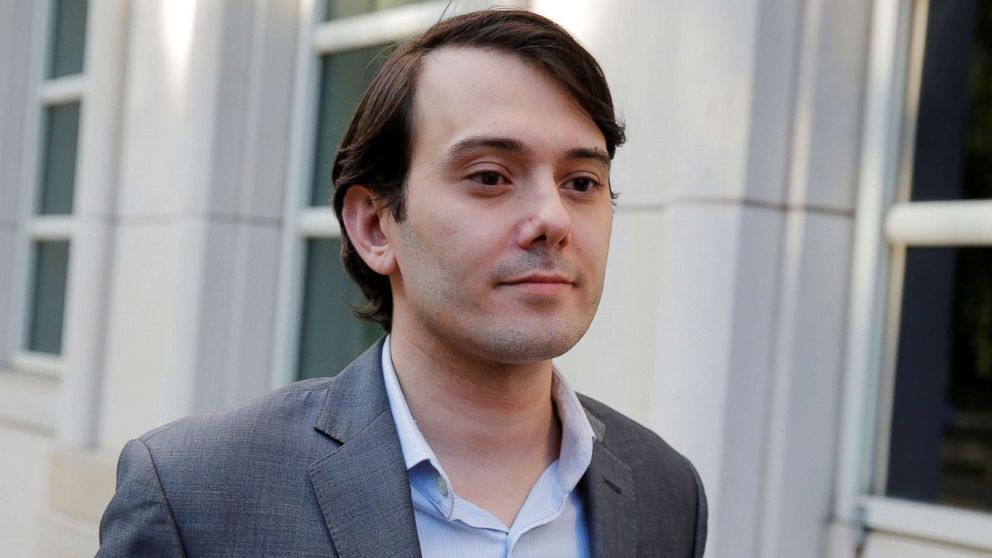[ad_1]
Convicted fraudster Martin Shkreli’s request to be freed from prison for three months to research a coronavirus cure was blasted by federal prosecutors as the “same kind of delusional self-aggrandizing behavior” that got him a lengthy sentence in the first place.
U.S. attorneys filed a motion on Tuesday asking a judge in the Eastern District of New York to reject the compassionate-release request by the so-called Pharma Bro.
“Shkreli has no formal scientific training and no experience working [in] a laboratory setting, and he does not explain why he cannot continue to develop and discuss any ideas he may have about COVID-19 from prison, as he has,” prosecutors wrote in their motion to U.S. District Judge Kiyo Matsumoto.
Matsumoto is the same Brooklyn judge who sentenced Shkreli in 2018 to 84 months in prison and made him forfeit more than $7 million after a jury found him guilty of securities fraud. At the time of Shkreli’s sentencing, Matsumoto said the former drug company CEO had minimized his criminal conduct and engaged in an “egregious multitude of lies.”
The judge has not said when she’ll issue a ruling on Shkreli’s request. Prosecutors have argued she has no authority to do so because Shkreli has yet to exhaust administrative remedies to get out of prison, including the appeal of his initial denial by a prison warden to the federal Bureau of Prisons.
Defense attorney Benjamin Brafman filed a motion this month asking Matsumoto to release Shkreli to home confinement at his fiancee’s New York City apartment, pleading that Shkreli is not a danger to the community and would “potentially help others” find a “potential cure” for COVID-19, which as of Wednesday had killed more than 200,000 people worldwide among more than 3.1 million infected.
“I have always said that if focused and left in a lab, Martin could help cure cancer,” Brafman said in a statement released earlier this month. “Maybe he can help the scientific community better understand this terrible virus.”
In a research proposal posted online, Shkreli slammed the pharmaceutical industry’s response to the pandemic, which has killed more than 58,000 people in the United States, as “inadequate,” and suggested researchers at every drug company “be put to work until COVID-19 is no more.”
In the proposal he wrote from the low-security Allenwood Low Federal Correctional Institution in Pennsylvania, Shkreli described himself as a “successful two-time biopharma entrepreneur, having purchased multiple companies, invented multiple new drug candidates.”
“I am one of the few executives experienced in ALL aspects of drug development. I do not expect to profit in any way, shape, or form from coronavirus-related treatments,” Shkreli wrote in his proposal, adding that he would work to “contribute to the betterment of society.”
Federal prosecutors scoffed at the proposal.
“Even if Shkreli were somehow able to develop a potential cure, there is no evidence that he would, in fact, use it to ‘contribute to the betterment of society,’ as he claims, rather than to enrich himself to the maximum extent possible, including by concealing his work or declining to provide such a cure to others unless he were paid an exorbitant sum,” prosecutors wrote in their motion. “As the evidence at trial demonstrated, Shkreli’s involvement in the search for cures to diseases was primarily motivated by the potential to make tremendous profits.”
While Brafman wrote in his court filing that Shkreli suffers from “severe allergies,” prosecutors described Shkreli as a healthy 37-year-old with none of the underlying conditions that would put him at high risk for contracting coronavirus while in prison.
On April 16, the warden at Allenwood Low prison denied Shkreli’s initial Bureau of Prisons petition to be released.
In their motion, prosecutors said that as of Tuesday there were no confirmed cases of COVID-19 at the Allenwood Low prison.
Prosecutors also noted that Shkreli has served less than half of his sentence. They argued it would be difficult to enforce the conditions of Shkreli’s temporary release and noted that “Shkreli would have to be returned to prison after he has been exposed to multiple others in New York City at the height of the pandemic.”
Shkreli, who first became infamous for hiking the price of a lifesaving HIV drug from $13.50 a pill to $750 a pill, was indicted along with co-defendant Evan Greebel in 2015 on multiple securities fraud charges linked to health care heavy hedge funds MSMB Capital Management and MSMB Healthcare Management. A superseding indictment in 2016 charged Shkreli and Greebel with additional fraud charges tied to the biopharmaceutical company Retrophin, Inc.
Shkreli and Greebel, prosecutors said, conducted long-running schemes in which they used bogus information that defrauded investors in their hedge funds and looted their biopharmaceutical company of more than $10 million to pay back disgruntled investors.
[ad_2]
Source link

